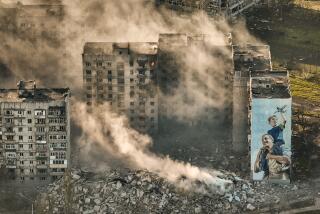America From Abroad : Chechnya Rebels Are Ambivalent Toward U.S. : Some admire things American, but they are disappointed in Washington’s policy.
- Share via
ACHKHOI-MARTAN, Russia — Shamsurdin Midayev held a chunk of gray metal, part of a Russian rocket that had smashed through the roof of his home, and shook it angrily in what he believed to be the general direction of Bill Clinton.
“You Americans give them credits so they can buy this,” roared Midayev, 38, a tall accountant with a potbelly and a dark pirate’s mustache. “This is your humanitarian aid to Russia!”
The furious accountant was talking about the International Monetary Fund’s decision to lend Russia $6.4 billion. The money was allocated to help restructure Russia’s post-Communist economy, but Chechens do not see it that way. They see the West picking up the tab for Moscow’s 3-month-old war to crush their independence.
This is not the first time the West--and President Clinton, who was once quite popular in Chechnya--has disappointed the fighters of the breakaway republic.
“We understand, America doesn’t want to ruin relations with Russia over little Chechnya,” said Arbi Alaskhanov, 35, a fighter in Gudermes. “But even the slightest comment (from Washington) in favor of Chechnya is a gift. . . . “
So far, the most visible American aid to the Chechen military comes from Rizvan Tchitigo, a 28-year-old Chechen fighter who lived a year in Seattle and who flashes his Washington State driver’s license to convince his comrades that he is an American citizen.
When the war broke out, Tchitigo bought camouflage outfits for the Chechens at a U.S. Army surplus store in Seattle. Because he already knew who his comrades-in-arms would be, he also had 12 American-style dog tags printed up, in English, for his friends. Tchitigo’s dog tag includes his name, birth date and the misspelled title “Chechin Republic.”
“Go ahead and write it all down--name, date, whatever. To hell with the KGB, I’m going back to America after the war,” Tchitigo said.
Partly as a joke, partly out of admiration for the United States, Tchitigo sends the tanks under his command into battle flying U.S. flags. One of his armored personnel carriers flies a U.S. Coast Guard flag.
As he watched a Chechen T-80 tank roar out of hiding and head for battle with a U.S. flag streaming proudly from an antenna, Tchitigo joked with his men.
“How many states are there now in America? Thirty, right? What, 50? Really? That many? Well, then let Chechnya become the 51st!”
But other than flags and dog tags, a roll of Rolaids tablets was all the “American aid” Tchitigo could bring to Chechnya. His U.S. Army camouflage outfits were confiscated by Russian customs.
“If Americans would help just a little, we’d be in good shape,” Tchitigo said. “Even a little moral support would be great.”
The Russians have bombed civilians in Chechnya for months. Yet in Chechen eyes, Clinton appears more worried about embarrassing Russian President Boris N. Yeltsin than about the women and children Yeltsin’s war is killing.
“We prayed to the Almighty that Clinton would become President” in 1992, said Vakha Arasanov, 36, a leader of resistance fighters in the village of Samashki.
Arasanov said Dzhokar M. Dudayev, proclaimed president of the secessionist republic, asked Muslim leaders to pray that Clinton would unseat President George Bush.
“Dzhokar told me and others to tell the elders to pray for Clinton, the Democrat,” Arasanov recounted. “Because Dzhokar said a Democrat would put Yeltsin in his place. We heard (Clinton’s) promises to Haiti, for example. And we prayed.
“That’s how we hoped on the Americans, and you, well, you’ve left us hungry,” he concluded politely.
Admiration for Clinton quickly soured after his early comments on the Chechen-Russian war were translated and broadcast throughout the former Soviet Union.
In a radio interview in late December, Clinton urged the Russians to resolve the war with “the least possible violence.” In Russian, that was widely translated as “little bloodshed”--and that unfortunate phrase is what Clinton is notorious for here.
“That was a super-cynical thing to say,” said Lom-Ali Shamayev, 34, a Chechen fighter with a Manhattan address and a son, Musa, who was born at New York’s Cornell University Medical Center.
Musa, 20 months old, is an American citizen. His older brother Muslim, 4, is a Russian citizen.
“My son, an American citizen, might one day himself become President of America, if I correctly understand your Constitution,” Shamayev said over a cup of tea.
“So can you ask your President, Mr. Bill Clinton, from me and on behalf of my son: Does Clinton understand that that ‘little blood’ shed could be American? And what is a ‘little bloodshed’ anyway? A drop or a cistern, it’s blood and death.”
More to Read
Sign up for Essential California
The most important California stories and recommendations in your inbox every morning.
You may occasionally receive promotional content from the Los Angeles Times.













